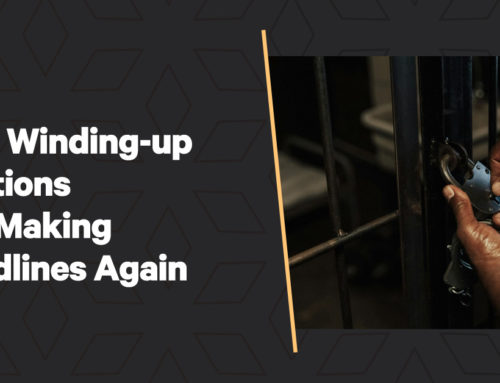Recently, the UK has witnessed a concerning trend – a surge in company insolvencies. This phenomenon is closely tied to various economic factors, but one significant contributor is the prevalence of high interest rates. The economic landscape has been marked by uncertainty, worsened by global events such as geopolitical tensions and the aftermath of the COVID-19 pandemic. These factors, combined with inflationary pressures and supply chain disruptions, have created a perfect storm for businesses. As interest rates rise, the cost of borrowing escalates, putting strain on businesses already grappling with reduced consumer spending and heightened operational expenses. In this blog, we’ll delve into how high interest rates are fueling a surge in company insolvencies, exploring the underlying mechanisms and implications for businesses across the UK. Through a full analysis, we aim to shed light on the multiple issues that businesses face in today’s economic climate, as well as provide insights into techniques for managing these choppy waters.
Understanding Interest Rates
Interest rates, set by the Bank of England’s Monetary Policy Committee, play a pivotal role in shaping the economy. These rates influence borrowing costs for businesses and consumers alike. When interest rates rise, borrowing becomes more expensive, impacting companies’ ability to access credit.
What’s more, interest rates impact consumer spending patterns, affecting businesses across sectors. For example, higher mortgage rates can reduce disposable income, leading to decreased consumer spending on non-essential goods and services. This demand reduction can further strain businesses’ cash flow and profitability.
The Impact on Businesses
For businesses, especially those operating on thin margins or facing cash flow challenges, higher interest rates can be particularly difficult. Increased borrowing costs squeeze profit margins, making it harder to meet financial obligations such as loan repayments and operational expenses.
Plus, high interest rates can deter investment and expansion plans. Companies may postpone or scale back projects due to the elevated cost of financing. This can stifle growth prospects and limit job creation, further making economic pressures worse.
Debt Servicing Struggles
A surge in interest rates can amplify the burden of existing debt for businesses. Companies with variable-rate loans or debt instruments tied to prevailing interest rates face higher repayments, potentially straining their cash flow. What’s more, businesses with large debt loads may find it challenging to refinance at favourable terms, leading to liquidity problems and, in severe cases, insolvency.
On top of the direct financial implications, struggling to service debt can have wider repercussions for businesses. Defaulting on loan repayments can damage credit ratings, making it harder to secure future financing or negotiate favourable terms with suppliers and creditors. This can further add financial distress and increase the likelihood of insolvency proceedings.
Sector-Specific Vulnerabilities
Industries heavily reliant on borrowing, such as property development and construction, face heightened risks in the face of high interest rates. These sectors often require substantial upfront capital for projects and are particularly sensitive to fluctuations in financing costs. Higher borrowing expenses can delay construction timelines, inflate project budgets, and erode profit margins, posing significant challenges to companies operating within these sectors.
Similarly, consumer-facing businesses may experience reduced demand as households rein in spending to cope with higher borrowing costs. Discretionary spending on non-essential goods and services may decline as consumers prioritise essential expenses, further impacting profitability for businesses reliant on consumer purchasing power.
Supply Chain Disruptions
The ripple effects of high interest rates extend beyond individual businesses to the broader supply chain. Suppliers and vendors may face financial strain, leading to disruptions in the production process and delayed deliveries. This can create extra challenges for companies already struggling with the fallout of rising interest rates, compounding their difficulties.
What’s more, supply chain disruptions can undermine business continuity and erode customer trust. Delays in receiving essential materials or components can result in production bottlenecks, leading to missed deadlines and lost sales opportunities. Maintaining robust supplier relationships and exploring alternative sourcing options can help mitigate these risks and enhance supply chain resilience.
Navigating Financial Distress
In the face of mounting financial pressure, businesses must adopt proactive strategies to reduce risks and safeguard their viability. Seeking professional advice from insolvency practitioners can provide valuable insights and help in restructuring debt, negotiating with creditors, and exploring alternative financing options.
Plus, businesses should conduct thorough financial assessments to identify areas of vulnerability and implement cost-saving measures where possible. This may involve streamlining operations, renegotiating contracts, or diversifying revenue streams to boost resilience in the face of economic uncertainties.
Strategies for Success
The rise in company insolvencies in the UK is a complex issue with far-reaching implications for businesses and the economy at large. While high interest rates represent a significant contributing factor, they are just one piece of the puzzle. Economic volatility, regulatory changes, and shifts in consumer behaviour all have a significant impact on the business environment.
However, amidst these challenges, there are opportunities for proactive management and strategic interventions to mitigate risks and drive sustainable growth. By embracing innovation, diversifying revenue streams, and optimising operational efficiencies, businesses can adapt to changing market conditions and capitalise on emerging opportunities.
What’s more, seeking expert guidance from insolvency practitioners and financial advisors can provide invaluable support in managing turbulent times and charting a course toward long-term success. With a combination of resilience, foresight, and adaptability, businesses can emerge stronger from financial adversity and position themselves for sustained prosperity in the years ahead.
Get Expert Advice
As trusted advisors specialising in corporate restructuring and insolvency, we understand the challenges facing businesses in today’s economic climate. Our team offers tailored solutions to help companies handle financial distress and reposition them toward sustainable recovery.
Whether you’re experiencing cash flow difficulties, creditor pressures, or other financial challenges, our experienced professionals are here to help you every step of the way. Don’t let high interest rates derail your business ambitions – contact us today to explore how we can help safeguard your company’s future.
Call us on 0800 246 1845 or email us at mail@leading.uk.com to schedule a confidential consultation with one of our experts.






